الملخص
Tennessee Williams’s A Cat on a Hot Tin Roof centers Brick Pollitt; he is filled with disgust because he feels that he is a truthful man surrounded by liars and schemers. Each character has a different concept of truth and morality, Brick's being the most rigid in definition, and it is this rigidity that causes Brick’s personal crisis. By exploring Satrean existentialism, the foundations of Brick’s crisis are revealed as rooted in an inability to act in alignment with his preconceived identity. Intersecting this personal crisis is America’s idealized conception of childhood homoeroticism as well as Alfred Kinsey’s study Sexual Behavior in the Human Male, both of which inform Brick’s relationship with his late best friend. Brick rejects the social world instead of accepting complication, but is still asked to participate in his family structure. His wife and his father simultaneously uphold and subvert the strict structures of the American South; they find ways to accept complication in their own lives, especially when finding themselves in a socially marginalized position. While Brick’s privilege has protected him from facing the painful yet necessary complexities of being alive, Maggie and Big Daddy accept truth as subjective and make space for human complexity.

هذا العمل مرخص بموجب Creative Commons Attribution 4.0 International License.
الحقوق الفكرية (c) 2021 Catherine Ferrante

